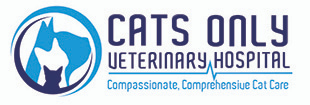We recommend canned diets over dry diets for a number of reasons:
• Canned diets are closer to what cats should be eating…small mammals.
• Cats are carnivores and should be eating a high protein/moderate fat/low carbohydrate diet. Canned food achieves this goal much better than a dry food.
• Cats are not “drinkers” and acquire most of their water consumption through eating prey. Canned food has much more water (~70-80%) than dry food (~6-10%).
• We blame many cat diseases on dry diets (i.e. urinary, diabetes, obesity).
• Canned diets have much less calories than dry diets. Many cats are overweight and this is mainly due to leaving a high calorie dry food in a bowl all day, every day.
I thought dry food protected my cat’s teeth?
Unfortunately, this statement is false. There is no benefit from dry food in regards to your cat’s dental health. Only VOHC-approved diets & treats help prevent plaque & tartar. The VOHC is a group of veterinary dentists who put their “stamp of approval” on products proven to reduce plaque & tartar. You cannot trust any dental health claim on over-the-counter diets & treats if it does not have the VOHC-approved seal. Check out their website at www.vohc.org.
Why feed dry food at all? For many cat owners, dry diets are preferred because…
• Cost – dry food is generally lower in cost than canned food.
• Convenience – dry food does not “go bad” if left out (i.e. pour it in a bowl and leave it all day)
• The “ick” factor – canned food is gross, it smells, and you have to clean the bowls afterwards.
These reasons, while valid points, are for the benefit of the human, not the cat. As a general rule, feed more canned food and less dry food. Feeding both canned & dry diets is preferred to just feeding a dry diet. The more canned food, the better.

